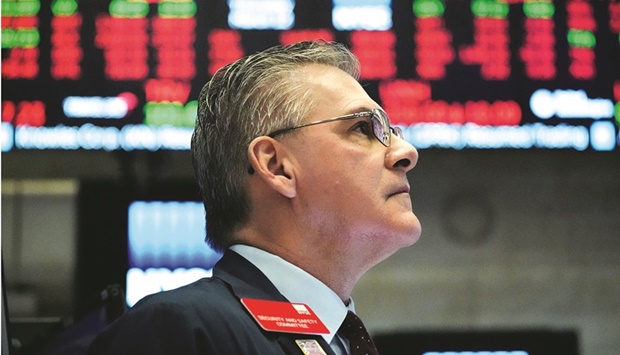Global stock and bond markets are at risk of a sell-off because central banks including the Federal Reserve may be forced to raise interest rates more than investors anticipate to tame inflation, a top International Monetary Fund official said.
The odds of a major market sell-off would be increased if monetary policy tightening is combined with a recession, Tobias Adrian, director of the IMF’s monetary and capital markets department and a former senior vice president of the Federal Reserve Bank of New York, said in a phone interview late on Tuesday.
The Washington-based fund earlier in the day slashed its world growth forecast by the most since the first months of the Covid-19 pandemic, and projected even faster inflation, after Russia invaded Ukraine and China renewed virus lockdowns.
In particular, the IMF is warning about the danger from food-price spikes for governments whose ability to limit price increases by fiscal measures is already constrained by record debt from pandemic spending.
“Central banks may have to tighten more than what is currently priced in, so there could be surprises down the road,” Adrian said. “I do think equities could see another sharp sell-off. Bonds could sell off further. Credit spreads have widened, but not dramatically so far. And yields could go up further. There could be further sell-off in rates of fixed-income, sovereign securities. So I think nothing is safe right now.”
The IMF sees inflation for this year at 5.7% in advanced economies and 8.7% in emerging and developing countries, significantly higher than just a few months ago. The pace of consumer-price increases is expected to slow to 2.5% and 6.5% respectively in each group of nations in 2023. The IMF cited a rising risk that inflation expectations become unanchored, prompting more aggressive central bank tightening.
In the US and some parts of Europe, inflation is accelerating at the fastest pace in decades amid soaring food and energy prices, spurring expectations for central banks to tighten monetary policy more quickly than previously foreseen.
Food inflation is particularly dangerous in poor countries, including in sub-Saharan Africa, where households are spending up to 60% of their budgets on food, compared with just 10% in advanced economies, according to the IMF. Food prices are rising due to the disruption of production in Russia and Ukraine, and some governments will face unrest and will need financial support from the international community, the fund said.
Governments in emerging markets are strained by debt that rose to an estimated 64% of gross domestic product by the end of last year, and should target support through temporary cash transfers to vulnerable groups, according to the fund. About 60% of low-income countries are at high risk of debt distress or have already entered that state, making them especially vulnerable, said Vitor Gaspar, director of the IMF’s fiscal affairs department.
“Low-income countries are among those that have the most constraining fiscal space, which highlights the urgency of the situation of food security in these countries,” Gaspar said in a briefing on Wednesday. “And that requires decisive action on the part of national authorities but also the global community.”

A trader works on the floor at the New York Stock Exchange (file). The odds of a major market sell-off would be increased if monetary policy tightening is combined with a recession, said Tobias Adrian, director of the IMF’s monetary and capital markets department and a former senior vice president of the Federal Reserve Bank of New York.
